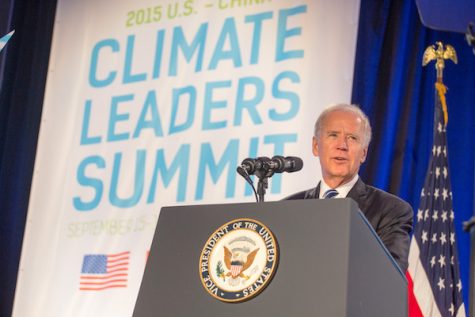OPINION | Biden may not be savior Cancer Alley needs
Between Baton Rouge and New Orleans, along the Mississippi River, lies the area commonly referred to as “Cancer Alley.” This region, including both the previously mentioned cities and the riv

er parishes of Louisiana, such as St. James Parish, contains over 100 plants of various industries and varieties.
Cancer Alley serves as a sacrifice zone, a designated area that is, as the name suggests, “sacrificed” in the name of industry by exposure to toxic waste. The affected communities, in Cancer Alley and other sacrifice zones, tend to be low-income and non-white. Owing to this, Louisiana, whose two largest metropolitan areas reside in this region, has disproportionately high rates of cancer among its communities, hence the region’s name.
The high presence of toxic and industrial waste has not gone unnoticed in Louisiana, as the climate fluctuates and the environment becomes less hospitable. This week’s extremely rare freezing weather, a particularly damaging hurricane season, and cases such as Gordon Plaza in New Orleans all demonstrate the painful legacy these pollution clusters create.
Cancer Alley, Gordon Plaza, and the ways in which poor, non-white communities are much more susceptible to climate crises all stem from environmental racism. This term was introduced to address discovered links between race, class and risk of exposure to environmental hazards.
While the inhabitants of residential zones such as Cancer Alley are exposed to toxins and suffer from volatile weather conditions in these areas, they hardly reap any of the benefit from the presence of these corporations. Employment at the plants and factories that pollute and raze these communities and their land is not reflective of them; they’re excluded from the economic benefit gained at their expense.
From his stance on and policy against the Paris Agreement under the United Nations Framework Convention on Climate Change to his rollback of several varied climate policies, former President Donald Trump definitively challenged environmentalists and other climate justice activists. As the era of Trump’s presidential reign comes to a close, many Americans have looked to the new presidential administration for reassurance that some of the damage done over the past four years will be reversed.
Although President Joe Biden may seem like a climate savior in comparison to the past four years, and has taken a much more urgent tone to the issue, Americans should be cautious of his policies. For example, Biden has refused to properly back the Green New Deal, a set of policy proposals that seek to tackle the climate crisis alongside American labor conditions. Such a policy would be crucial to Cancer Alley, Louisiana, and other regions of the American south that are beholden to climate-unfriendly industries that cannot easily untangle themselves economically and pursue green energy initiatives.
Biden’s inability to commit to banning fracking further reinforces his timid policy approach to climate change. Seeking to find a midpoint with industry titans instead of combating this issue fiercely is clearly the way Biden intends to go. One of Biden’s recent White House appointees, Cedric Richmond, is a fracking advocate and politically funded by fossil fuel corporations. Despite hailing from Cancer Alley himself, Richmond clearly does not have the interests of working class victims of environmental catastrophe and racism at heart.
While Cancer Alley constituents can certainly strive to push the Biden administration to embrace more climate-justice oriented policies, such as the Green New Deal, climate- and pollution-based reparations, or even foreign debt relief to Global South countries that have been harmed by Western industrialism, their approach can and should involve more immediate work. Pushing local politicians to address the climate crisis seriously, and working with grassroots organizations and initiatives should be considered. From Sunrise Movement’s New Orleans or Tulane chapter to Gordon Plaza residents’ and City Waste Union members’ struggles for better living and working conditions, to even working to push Tulane to divest from fossil fuels, students and community members alike can complete work to address this crisis.
Your donation will support the student journalists of Tulane University. Your contribution will allow us to purchase equipment and cover our annual website hosting costs.



Carol Ballantine • Mar 15, 2021 at 10:04 am
I am appalled at the thought of more emissions anywhere but especially in cancer alley. If allowed, we must require zero emissions.